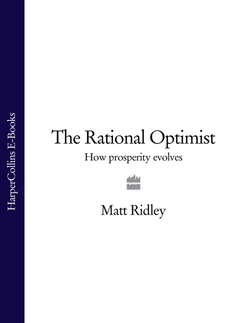Читать книгу The Rational Optimist: How Prosperity Evolves - Matt Ridley, Matt Ridley - Страница 18
The call of the new
ОглавлениеNone the less, you do not have to be starry-eyed about the Stone Age to find aspects of modern consumer society obscenely wasteful. Why, asks Geoffrey Miller, ‘would the world’s most intelligent primate buy a Hummer H1 Alpha sport-utility vehicle’, which seats four, gets ten miles to the gallon, takes 13.5 seconds to reach 60 mph, and sells for $139,771? Because, he answers, human beings evolved to strive to signal social status and sexual worth. What this implies is that far from being merely materialist, human consumption is already driven by a sort of pseudo-spiritualism that seeks love, heroism and admiration. Yet this thirst for status then encourages people to devise recipes that rearrange the atoms, electrons or photons of the world in such a way as to make useful combinations for other people. Ambition is transmuted into opportunity. It was allegedly a young Chinese imperial concubine in 2600 bc who thought up the following recipe for rearranging beta pleated sheets of glycine-rich polypeptides into fine fabrics: take a moth caterpillar, feed it mulberry leaves for a month, let it spin a cocoon, heat it to kill it, put the cocoon in water to unstick the silk threads, carefully draw out the single kilometre-long thread from which the cocoon is made by reeling it on to a wheel, spin the thread and weave a fabric. Then dye, cut and sew, advertise and sell for cash. Rough guide on quantities: it takes about ten pounds of mulberry leaves to make 100 silkworm cocoons to make one necktie.
The cumulative accretion of knowledge by specialists that allows us each to consume more and more different things by each producing fewer and fewer is, I submit, the central story of humanity. Innovation changes the world but only because it aids the elaboration of the division of labour and encourages the division of time. Forget wars, religions, famines and poems for the moment. This is history’s greatest theme: the metastasis of exchange, specialisation and the invention it has called forth, the ‘creation’ of time. The rational optimist invites you to stand back and look at your species differently, to see the grand enterprise of humanity that has progressed – with frequent setbacks – for 100,000 years. And then, when you have seen that, consider whether that enterprise is finished or if, as the optimist claims, it still has centuries and millennia to run. If, in fact, it might be about to accelerate to an unprecedented rate.
If prosperity is exchange and specialisation – more like the multiplication of labour than the division of labour – then when and how did that habit begin? Why is it such a peculiar attribute of the human species?
